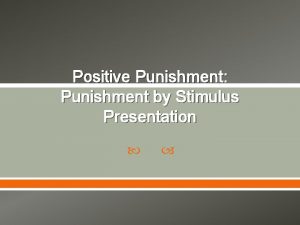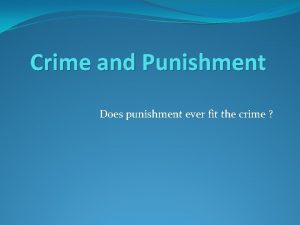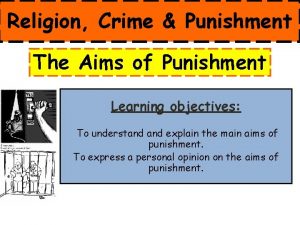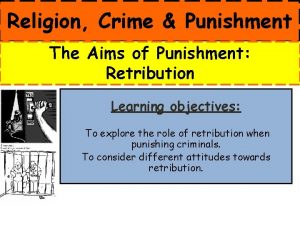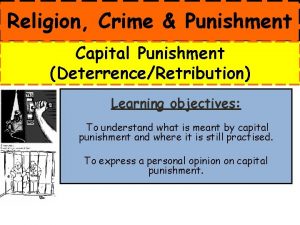Crime and Punishment A look at how and













- Slides: 13

Crime and Punishment A look at how and why we punish today

The Nature of Punishment Learning Objective: To know the four theories of punishment To consider what should be achieved by punishment

Can you suggest any crimes? Arson Money Laundering Prostitution Child abuse Assault Stalking Drug dealing Credit/debit card fraud Indecent exposure Tax Evasion Robbery Rape Why do you think they are crimes?

What would stop you from breaking the law?

How do we punish? If society has laws, it must also have punishments for those who break the laws. The main aim of punishment is to try to make sure everyone obeys the law. However there are several other theories about what punishment should do…

4 Theories of Punishment Retribution Deterrence Reform Protection

Complete this table in your book using the information to follow… Theory Retribution Deterrence Reform Protection Pro’s Con’s Effective at reducing crime? Who is being thought of in each – the offender? The victim? Society?

Retribution: The idea that punishments should make criminals pay for what they have done. Many people think that the punishment should make criminals pay for their crime in proportion to the severity of the crime they have committed. In the past such retributive punishments would have killed those who committed murder and taken the eyes out of those who blinded someone. Nowadays, those who believe in retribution think that criminals should suffer for what they have done wrong.

Deterrence: The idea that punishments should be of such a nature that they will put people off committing crimes Many people think that punishment should be very serve to deter people from committing crimes. For example, if someone knows they will have their hand cut off if they are caught stealing; then they will not steal; if people know they will be executed if they are caught murdering, they will not murder.

Reform: The idea that punishments should try to change criminals so they will not commit crimes again Many people think that punishment should be aimed at reforming the criminals so that they become honest law-abiding citizens who will not commit crimes again. Reformative punishments often involve giving criminals education and qualifications so that they do not feel the need to be a criminal

Protection: The idea that the general public should be kept safe Many people feel that society must be protected from violent people or persistent burglars, so punishments should put such criminals in prison where they are no longer a danger to society.

Look at your completed table… How do you think today’s society deals with punishment? Can you give any examples? Most forms of punishment are a mixture of theories. For example, imprisonment can deter, protect, inflict retribution and give reformation through education, training and counselling.

“We should understand a little less and condemn a little more”. Do you agree? Give reasons for your opinion, showing that you have thought about another point of view. Although we haven’t looked at religious responses, take an educated guess at what you think they might believe.
 Look up look down look left look right
Look up look down look left look right Wjec criminology revision notes unit 4
Wjec criminology revision notes unit 4 Crime and punishment revision guide
Crime and punishment revision guide Andrei semyonovich lebezyatnikov
Andrei semyonovich lebezyatnikov Crime and punishment in tudor times
Crime and punishment in tudor times Wjec criminology unit 3
Wjec criminology unit 3 Medieval crime and punishment facts
Medieval crime and punishment facts Gcse history past papers edexcel
Gcse history past papers edexcel Kahoot crime and punishment
Kahoot crime and punishment Crime and punishment in medieval japan
Crime and punishment in medieval japan Crime and punishment 1750 to 1900
Crime and punishment 1750 to 1900 Unit 4 criminology
Unit 4 criminology Crime and punishment key words
Crime and punishment key words Crime and punishment topic
Crime and punishment topic
















